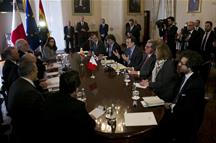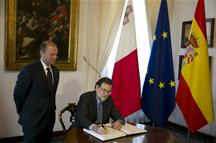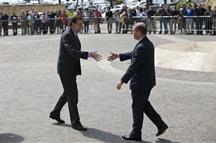"Minimising the uncertainty" felt by citizens and companies as a result of Brexit is the priority, says Mariano Rajoy
President's News - 2017.3.29
1. Images of Mariano Rajoy in the Republic of Malta | Pool Moncloa - 2017.3.29
Valletta, Malta
The President of the Government met in Valletta with the Prime Minister of the Republic of Malta and rotating president of the Council of the European Union, Joseph Muscat, to discuss the United Kingdom's departure from the EU, among other issues.
At the joint press conference given by the two leaders following their meeting, Mariano Rajoy referred to the official announcement by the British Government of its intention to withdraw from the European Union under Article 50 of the Treaty on European Union. "I respect the decision but am very sorry it has taken place. I don't think it is good for the United Kingdom in particular, but then nor do I think it is good for the EU as a whole", he said.
The President of the Government explained that the negotiation process that begins on Wednesday must conclude within two years; in other words, by 29 March 2019. On the following day, the treaties of the EU will no longer apply to the United Kingdom unless all Member States unanimously decide to extend the negotiations.
 Pool Moncloa/Diego CrespoMariano Rajoy stressed that "the Government of Spain and all other European institutions are ready for these negotiations". In this regard, he recalled that an inter-ministerial commission was set up which has been working for some time and met on Wednesday morning to study the document presented by the United Kingdom.
Pool Moncloa/Diego CrespoMariano Rajoy stressed that "the Government of Spain and all other European institutions are ready for these negotiations". In this regard, he recalled that an inter-ministerial commission was set up which has been working for some time and met on Wednesday morning to study the document presented by the United Kingdom.
Furthermore, he issued a message of "calm, confidence and serenity to all Spanish citizens living in the United Kingdom, as well as the British citizens living in Spain", as well as to those Spanish companies investing or trading in the UK and those British companies doing likewise in Spain.
The President of the Government said that his greatest priority during the negotiations will be "to minimise the uncertainty created by the United Kingdom's decision for our citizens, companies and Member States".
Mariano Rajoy reiterated that the Government of Spain will defend Spanish interests in these negotiations. "We want a balanced agreement but we also want - and we said this in Rome - the 27 Member States to continue making progress in the European integration process that has, without question, been one of the most important political operations undertaken on our continent in centuries".
Furthermore, he said that Spain will work "closely" with The European Union's lead Brexit negotiator, Michel Barnier. "We will maintain unity among the 27 during the negotiations", he said.
The President of the Government also said that he wishes to "maintain the closest, most beneficial and fruitful relations possible between Spain and the United Kingdom in the best interests of all citizens".
Meeting of Mediterranean European countries
 Pool Moncloa/Diego CrespoThe President of the Government announced that a meeting will be held of Heads of State and Government from Portugal, France, Malta, Italy, Cyprus, Greece and Spain in Madrid on 10 April, in line with those previously held in Athens and Lisbon. The main purpose of this meeting will be to monitor all efforts being made to undertake positive negotiations on Brexit.
Pool Moncloa/Diego CrespoThe President of the Government announced that a meeting will be held of Heads of State and Government from Portugal, France, Malta, Italy, Cyprus, Greece and Spain in Madrid on 10 April, in line with those previously held in Athens and Lisbon. The main purpose of this meeting will be to monitor all efforts being made to undertake positive negotiations on Brexit.
Mariano Rajoy asked the Maltese Prime Minister, in his capacity as rotating president of the Council of the European Union, "to make a proposal to all Mediterranean countries" for them to analyse issues related to the United Kingdom's departure from the EU.
Rome Declaration
During his speech, Mariano Rajoy highlighted the approval of the Rome Declaration because he believes it represents "a clear commitment" to increasing effectiveness in resolving the problems faced by citizens and "clearly states that Europe is increasingly united and will achieve greater integration in the future".
Furthermore, the President of the Government highlighted the efforts made by the Maltese presidency to make progress on the single market and, more specifically, two priority issues for Spain: the digital agenda and energy union.
Current affairs
When asked about the unfair treatment of other regions that the announcement made on Tuesday about investments in Catalonia totalling 4.2 billion euros might mean, Mariano Rajoy said that "now that the worst of the economic crisis is behind us, we are in a position to undertake and launch more infrastructure projects, throughout Spain as a whole as well as in Catalonia".
 Pool Moncloa/Diego CrespoIn this regard, the President of the Government referred to the works on the Mediterranean Corridor, which are taking place in various autonomous regions of Spain, and those on the high-speed railway network to the Basque Country, Galicia, Extremadura, Murcia and Granada.
Pool Moncloa/Diego CrespoIn this regard, the President of the Government referred to the works on the Mediterranean Corridor, which are taking place in various autonomous regions of Spain, and those on the high-speed railway network to the Basque Country, Galicia, Extremadura, Murcia and Granada.
Mariano Rajoy also stressed that the Government of Spain will continue to defend three principles "with crystal clarity". "The unity of Spain, national sovereignty, and equality in the rights and duties of all Spaniards, whoever they may be and wherever they may live", he said.
As regards the General State Budget for this year, the President of the Government confirmed that the next Council of Ministers will approve the bill and explained that the pace of talks with the various political forces is being stepped up in order for the public accounts to obtain the necessary majority in Parliament. "I don't want to say I am optimistic, I am trying to be realistic, but I do believe that the work being done will eventually bear fruit", he said.
Mariano Rajoy argued that preventing a government "that has come to power following two consecutive elections" from approving its budget makes no sense and would mean "creating obstacles" to economic recovery. "I am convinced that good employment and Social Security data will emerge from March, as well as the months to come. We need to harness this opportunity because opportunities are not always within our grasp", he said.





